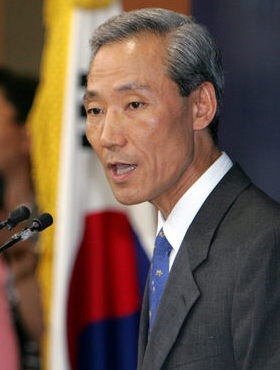hankyoreh
Links to other country sites 다른 나라 사이트 링크
U.S. to accept S.K. drug pricing system

South Korea’s health ministry said on Aug. 11 that the U.S. has agreed to accept the Korean government’s so-called positive-list system, which will only reimburse through insurance those pharmaceuticals approved by the Ministry of Health and Welfare.
Jeon Man-bok, the Ministry of Health and Welfare’s team leader for the U.S.-South Korea FTA, said in a press briefing that the two nations have agreed to hold a two-day working-level meeting on Aug. 21 in Singapore to discuss the pharmaceutical issue.
In June, both nations ended their second round of FTA talks with no major breakthrough achieved, mainly due to dispute over the Korean government’s new drug pricing policy.
Jeon said that the two sides "agreed to discuss procedural matters through meetings on medicine and medical equipment."
As Washington showed its willingness to accept Seoul’s drug pricing system, the Korean government is believed to have accepted the U.S. government’s request regarding related matters of procedure. The Korean government had called its pharmaceutical pricing system local policy and not a subject for negotiation during the FTA talks.
South Korea’s medical and public health industry had viewed the U.S.’s strong opposition on the drug pricing matter as a negotiation tactic. Washington’s real intention may be aimed at forcing Seoul to guarantee certain prices for new medicines produced by U.S. pharmaceutical companies.
From this point of view, the U.S. is expected to request South Korea to set up an independent body for foreign pharmaceutical companies to file complaints about drug pricing during the third round of FTA talks or the Singapore meeting. If South Korean negotiators accept the expected request, it will undermine or weaken South Korea’s policy sovereignty within its health insurance system. Australia accepted a similar compromise with the U.S. when the two were negotiating their FTA, which entered into force January 1, 2005.
The heath ministry said, "A view is needed to see the Korea-U.S. FTA talks as a harmonious procedure, not a weakening of policy sovereignty. As U.S. pharmaceutical companies will be directly affected by insurance-covered prices, we need to understand parts of the U.S. request."
South Korea and the U.S. launched free trade agreement talks in Washington in early June, hoping to sign the deal within a year. A second round of talks was held in Seoul last month and a third round is scheduled in Seattle on September 6-9.
Editorial・opinion
![[Column] Park Geun-hye déjà vu in Yoon Suk-yeol [Column] Park Geun-hye déjà vu in Yoon Suk-yeol](https://flexible.img.hani.co.kr/flexible/normal/500/300/imgdb/original/2024/0424/651713945113788.jpg) [Column] Park Geun-hye déjà vu in Yoon Suk-yeol
[Column] Park Geun-hye déjà vu in Yoon Suk-yeol![[Editorial] New weight of N. Korea’s nuclear threats makes dialogue all the more urgent [Editorial] New weight of N. Korea’s nuclear threats makes dialogue all the more urgent](https://flexible.img.hani.co.kr/flexible/normal/500/300/imgdb/original/2024/0424/7317139454662664.jpg) [Editorial] New weight of N. Korea’s nuclear threats makes dialogue all the more urgent
[Editorial] New weight of N. Korea’s nuclear threats makes dialogue all the more urgent- [Guest essay] The real reason Korea’s new right wants to dub Rhee a founding father
- [Column] ‘Choson’: Is it time we start referring to N. Korea in its own terms?
- [Editorial] Japan’s rewriting of history with Korea has gone too far
- [Column] The president’s questionable capacity for dialogue
- [Column] Are chaebol firms just pizza pies for families to divvy up as they please?
- [Column] Has Korea, too, crossed the Rubicon on China?
- [Correspondent’s column] In Japan’s alliance with US, echoes of its past alliances with UK
- [Editorial] Does Yoon think the Korean public is wrong?
Most viewed articles
- 1[Column] Park Geun-hye déjà vu in Yoon Suk-yeol
- 2Will NewJeans end up collateral damage in internal feud at K-pop juggernaut Hybe?
- 3Thursday to mark start of resignations by senior doctors amid standoff with government
- 4Why Korea shouldn’t welcome Japan’s newly beefed up defense cooperation with US
- 5‘We must say no’: Seoul defense chief on Korean, USFK involvement in hypothetical Taiwan crisis
- 6[Guest essay] The real reason Korea’s new right wants to dub Rhee a founding father
- 7N. Korean hackers breached 10 defense contractors in South for months, police say
- 8[Column] ‘Choson’: Is it time we start referring to N. Korea in its own terms?
- 9[Editorial] New weight of N. Korea’s nuclear threats makes dialogue all the more urgent
- 10Kim Jong-un expressed ‘satisfaction’ with nuclear counterstrike drill directed at South